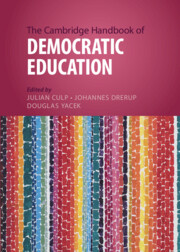Book contents
- The Cambridge Handbook of Democratic Education
- Cambridge Handbooks in Education
- The Cambridge Handbook of Democratic Education
- Copyright page
- Contents
- Contributors
- Acknowledgments
- Introduction
- Part One Historical Perspectives
- Part Two Philosophical and Normative Foundations
- Part Three Key Topics and Concepts
- Part Four Challenges
- 26 Wealth Stratification in US Higher Education and Democratic Education, 1890s–2020s
- 27 Mentoring and Instructional Duties of Professors
- 28 Racism, Moral Transformation, and Democratic Education
- 29 Postcolonial Perspectives on Democratic Education
- 30 Populist Challenges to Democratic Education
- 31 Religion and Democratic Education
- 32 The Epistocratic Challenge to Democratic Education
- 33 Climate Change and Democratic Education
- 34 The COVID-19 Pandemic and Democratic Education
- 35 Teacher Neutrality, Pedagogical Impartiality, and Democratic Education
- Index
- References
34 - The COVID-19 Pandemic and Democratic Education
from Part Four - Challenges
Published online by Cambridge University Press: 20 April 2023
- The Cambridge Handbook of Democratic Education
- Cambridge Handbooks in Education
- The Cambridge Handbook of Democratic Education
- Copyright page
- Contents
- Contributors
- Acknowledgments
- Introduction
- Part One Historical Perspectives
- Part Two Philosophical and Normative Foundations
- Part Three Key Topics and Concepts
- Part Four Challenges
- 26 Wealth Stratification in US Higher Education and Democratic Education, 1890s–2020s
- 27 Mentoring and Instructional Duties of Professors
- 28 Racism, Moral Transformation, and Democratic Education
- 29 Postcolonial Perspectives on Democratic Education
- 30 Populist Challenges to Democratic Education
- 31 Religion and Democratic Education
- 32 The Epistocratic Challenge to Democratic Education
- 33 Climate Change and Democratic Education
- 34 The COVID-19 Pandemic and Democratic Education
- 35 Teacher Neutrality, Pedagogical Impartiality, and Democratic Education
- Index
- References
Summary
The COVID-19 pandemic has led to far-reaching challenges in the field of (democratic) education. This chapter focuses on two aspects. First, as a measure to contain the spread of the coronavirus, schools in many countries were closed for extended periods of time. In this chapter, school closures are discussed as an issue of educational justice, with particular attention to the problem of an education for democratic participation. Second, the pandemic has raised questions of democratic legitimacy: The political measures taken to combat the virus were seen as illegitimate by parts of the population. In this context, there is disagreement about the basic facts regarding the virus and the response to it. The chapter discusses how teachers should deal with this kind of disagreement, in the classroom.
Keywords
- Type
- Chapter
- Information
- The Cambridge Handbook of Democratic Education , pp. 594 - 606Publisher: Cambridge University PressPrint publication year: 2023



